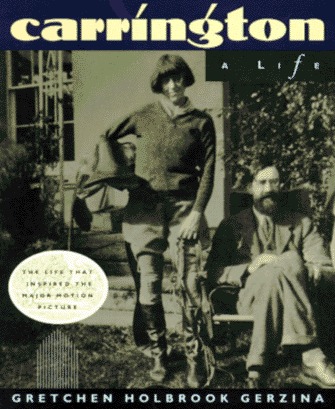Carrington fails the
official Scoopy litmus test for a great biography, in that it is
really only interesting because it is true. If you thought the film to
be about fictional characters, you probably wouldn't have much reason
to watch it. That failure notwithstanding, the film has many
positives:
- These people were odd and
interesting, so your curiosity will be piqued by their story. Just
how did they work all this out in reality?
- The photographic composition is
artistic and beautiful.
- The dialogue is witty and
literate. Strachey was a member of the famed Bloomsbury Group, the
English equivalent of the Algonquin Roundtable, a group of wits
and raconteurs who assembled frequently to exchange bon mots,
intellectual pleasantries and literary gossip. Keynes, the famous
economist, and the author Virginia Woolf were also members.
- It is acted beautifully by
Jonathan Pryce and Emma Thompson, who seem to evoke the originals
flawlessly. They look exactly like them, as well. When I first saw
the picture to the right, I thought it was from the film, but it
is the originals!
- It is educational, providing a
painless lesson on the customs and interests of the English
intelligensia between the wars
- Some of the scenes are excellent.
The one I liked best was shot from outside a mansion in which the
camera followed the pairing off of many lovers, then pulled back
to show Carrington sitting alone outside, just a spectator like
the rest of us. There was some brilliant camerawork in that scene
as well.
|

|
|
Is it a great movie?
No, not in the sense that it will have broad appeal to a wide range of
viewers. It is an excellent and straightforward chronological
recitation of their interesting lives, so is therefore interesting in
that regard. There is, however, no additional cinematic structure
imposed upon the script to give the film a life of its own. It is
interesting mainly because they were interesting.
|
|
It is a slow-paced film; not much
happens; it is subtle, and artistic. Those are not necessarily
weaknesses, but they are elements that most of you do not enjoy in a
film. If those elements do not scare you off, go for it, because
it is done well. I enjoyed it.
There is, in my opinion, one
weakness. Dora Carrington, as shown in the film, possesses no great
wit or charm. Nor is she quite beautiful, nor overwhelmingly talented.
So this biopic fails to answer the one question that I would consider
central to her life story, which is "why did one of the world's
most renowned literary figures love her so dearly, in a pseudo-erotic
way, despite the fact that she was the wrong sex for him?"
Frankly, although that seems to be the one interesting question that a
biopic should answer, I still didn't know "why" when the movie ended.
Tuna's comments in
yellow:
Carrington (1995)
tells the story of a platonic, but all-consuming love affair between
artist Carrington (Emma Thompson), and gay writer Lytton Strachey.
Throughout the course of the film, they each have many male lovers,
often the same men, but they remain bound together. Both were members
of the Bloomsbury Group, a gathering of British geniuses during WW I.
The film is entirely fixated on the sexual antics of members of the
group.
It was beautifully filmed and acted. Nevertheless, I was disappointed.
In knew very little about these people before the film started, and I
still know little about them. It is essentially a story of sexual
exploits counterbalanced by the platonic love, but certainly doesn't
have enough erotic content to carry that theme for two hours. I was
completely unable to see what all of the men she paraded through her
bedroom saw in her. In point of fact, the eye candy only took me so
far, and I couldn't wait for it to end.
|
The
Critics Vote
General consensus: three stars or more. Ebert
4/4, Berardinelli 3.5/4, filmcritic.com 2.5/5, Maltin
3/4.
|
The People
Vote ...
- With their
dollars ... arthouse distribution - grossed $3 million
in the USA
|
| IMDb
guideline: 7.5 usually indicates a level of
excellence, about like three and a half stars
from the critics. 6.0 usually indicates lukewarm
watchability, about like two and a half stars
from the critics. The fives are generally not
worthwhile unless they are really your kind of
material, about like two stars from the critics.
Films under five are generally awful even if you
like that kind of film, equivalent to about one
and a half stars from the critics or less,
depending on just how far below five the rating
is. My own
guideline: A means the movie is so good it
will appeal to you even if you hate the genre. B means the movie is not
good enough to win you over if you hate the
genre, but is good enough to do so if you have an
open mind about this type of film. C means it will only
appeal to genre addicts, and has no crossover
appeal. D means you'll hate it even if you
like the genre. E means that you'll hate it even if
you love the genre. F means that the film is not only
unappealing across-the-board, but technically
inept as well.
Based on this
description, Scoop says, "This film is a C+. A biopic with integrity, but not
much energy, and no cinematic hook. It's just a
straightforward chronological recitation of the highlights,
but is often interesting because they themselves were interesting. Well
done, but with appeal to a very narrow target market."
Tuna says, "The
proper score is C+, a very well made film that you will enjoy
if it is your sort of film."
|
|

